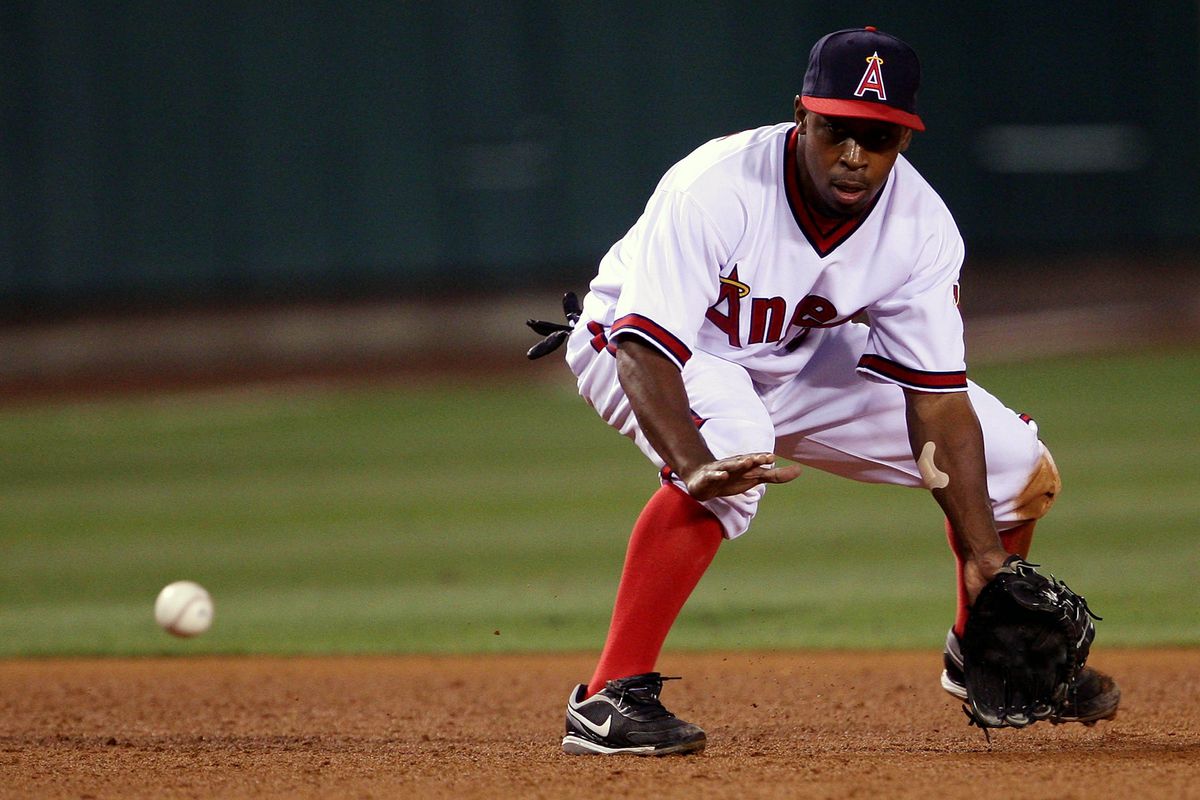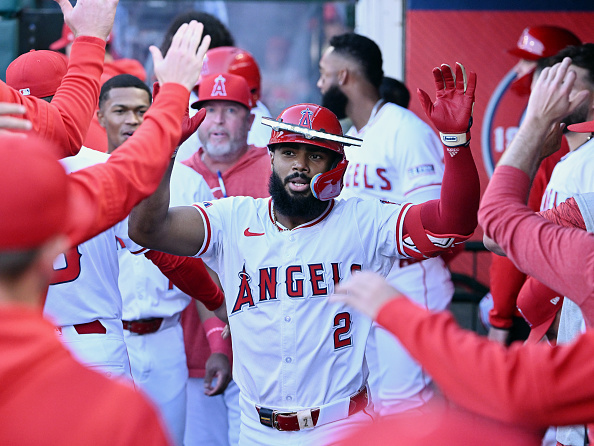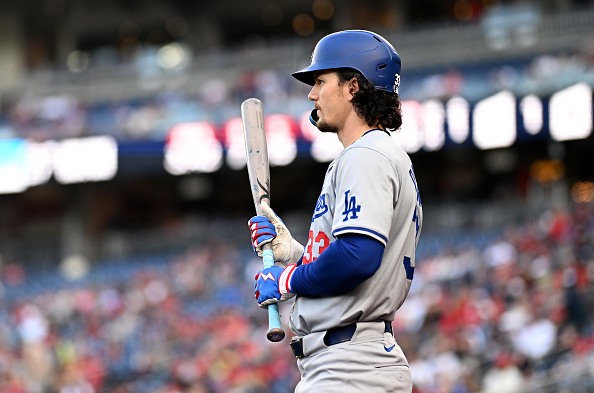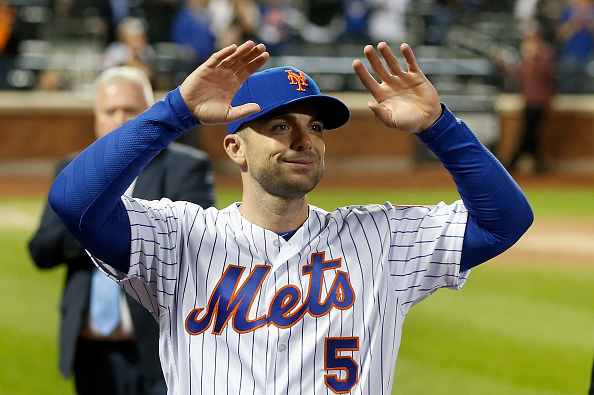As the Baseball Hall of Fame is expected to announce its newest members on Tuesday afternoon, one player is likely to fall off after his first season on the BBWAA ballot. While it remains to be seen if Chone Figgins receives any votes for the Hall of Fame, he represents one of two players on the ballot that were Angels during their eight most successful seasons in club history. While many think of Mike Trout, Tim Salmon, Garret Anderson, Vladimir Guerrero, Rod Carew, Nolan Ryan, and Bobby Grich as the most iconic Angels in franchise history, it was during Chone Figgins’s tenure that they experienced their most successful period ever.
Figgins and pitcher John Lackey are the only two regulars that were Angels between 2002 and 2009. Figgins’s time with the Angels was limited in 2002 and 2003 but their record during Figgins’s stint on the Halos’ roster was 636 wins and 456 losses. The result was a .582 winning percentage during Figgins’s tenure on the Angels’ active roster and the most successful tenure by any player in club history. Figgins would play almost everywhere on the field and the Angels never won less than 89 games in his eight seasons with the Angels. The Angels have only won 89 games or more through two other seasons in the past 30 years.
Figgins was acquired from the Colorado Rockies in July of 2001 as a Double-A prospect in the Colorado Rockies’ organization in exchange for veteran outfielder, Kimera Bartee. Bartee finished his MLB career with the Rockies going 0-for-15 in 19 games, making the trade one of the most successful in Angels history. Figgins would play the majority of 2002 at the Angels’ Triple-A Salt Lake affiliate before being promoted in August and becoming a valuable late-season and postseason weapon on the bases for the Angels. Figgins would participate as a late-inning pinch-runner in all three postseason series as the Angels advanced to claim their one and only World Series title.
Figgins wouldn’t establish himself as an everyday fixture in the Angels’ lineup until the 2004 season. Figgins would find a place in the lineup at six or more positions in each of the three seasons from 2004 and 2006 before establishing himself as the everyday third baseman in 2006. When David Eckstein left for St. Louis in 2005, he took over the lead-off spot in the lineup and ran away with the opportunity. Figgins would lead the league with 62 stolen bases in 2005 and his 280 swipes are the most in franchise history. To date, Figgins ranks in the top 10 in several Angels offensive categories, including batting average, on-base percentage, triples, runs scored, and walks. Figgins’s 17 triples in 2004 are the most in franchise history and his stolen base totals for 2005 and 2006 are the second- and fifth-best single-season totals in club history.
Figgins would receive MVP votes in four seasons with the Halos, finishing in the top 10 in his 2009 season. In his final season with the Angels, he was named to his only All-Star game before leaving the Angels to sign a four-year, $35 million contract with Seattle. The Angels lost a fan favorite when Figgins departed and lost one of their greatest lead-off hitters in club history. The Angels have struggled to find a consistent lead-off hitter and successful starting third basemen since Figgins’s departure.
Figgins’s performance never matched that of his years with the Angels in Seattle but his legacy as an Angels great will never die. Figgins’s 22.3 fWAR during his eight seasons with the Angels has not been matched by the total fWAR (22.0) of an Angels third baseman in the 10 seasons since. While the Angels never won less than 89 games in Figgins’s eight Angels seasons, they have had only one other season with that many since.
Figgins deserves the honor of being on this year’s Hall of Fame ballot. While Figgins may not earn a plaque in Cooperstown, fans cannot deny the Angels were never more successful than during his eight seasons as a member of their club. Figgins was a spark plug that will forever be remembered as one of the Angels’ greatest weapons in a decade that featured a championship and six playoff seasons.
Angels This Week
Major League Baseball has created what is being referred to by many as the “Ohtani Rule” for MLB rosters and rehabilitations. Ohtani, and other two-way players, will be allowed to remain active on their MLB rosters as the team’s designated hitter while still being allowed to pitch rehabilitation games in the minor leagues. Previously, players would have to remain on MLB’s injured list in order to participate in rehab assignments. This will allow the Angels to keep Ohtani in the Angels’ lineup in the event that he’s not ready to pitch on Opening Day.
Former MLB pitcher Buddy Carlyle has been named the new Angels minor-league pitching coordinator. Carlyle pitched in 150 MLB games across nine seasons with the Padres, Dodgers, Braves, Yankees, and Mets. Carlyle was the pitching coach for Double-A Mobile last season and he replaces Matt Wise, who was promoted to bullpen coach two weeks ago.
Angels general manager Billy Eppler stated last week that he intends to bring recently-acquired Matt Andriese into camp as a starting pitcher. Andriese joins Andrew Heaney, Griffin Canning, Dylan Bundy, Julio Teheran, Patrick Sandoval, Dillon Peters, Jaime Barria, Jose Suarez, Felix Pena, and Shohei Ohtani as the Angels’ starting pitchers. Ohtani, Canning, and Pena are all coming off season-ending injuries last year and Andriese now provides depth in the event any of these players are not ready Opening Day.
Angels Down on the Farm Report
Chone Figgins’s versatility in the field and speed will likely never be seen again, but the Angels do have some speedy prospects with stolen base potential for future Angels clubs.
Angels first-round selection Jordyn Adams is a five-tool athlete and his speed came out with 16 stolen bases in 22 attempts at the three lower levels in 2019. The centerfielder’s power potential could lead him away from the lead-off spot at the MLB level eventually, but his speed cannot be denied.
Bahamas native Trent Deveaux was one of several Bahamian players signed by the Angels in 2017. The 19-year-old Deveaux still holds a lot of power potential but has displayed his speed early in his pro career. Deveaux had 16 stolen bases in 22 attempts between the Arizona League Angels and Orem Owlz last season.
Brandon White stole 61 bases in his three seasons with West Virginia Mountaineers before being selected by the Angels in the 17th round of last year’s MLB draft. White debuted professionally with Orem and swiped 11 bases in 16 attempts while hitting .281 for the Owlz.
Torii Hunter, Jr. is 24 years old and has yet to play above the Single-A level but his baserunning success can be undenied in his first three seasons of pro ball. Hunter’s baseball stint was cut short when he played college football at Notre Dame but his success on the bases has been on display. Through Hunter’s first 239 games, he has stolen 59 bases in 70 attempts, including going 17-for-20 last season.







